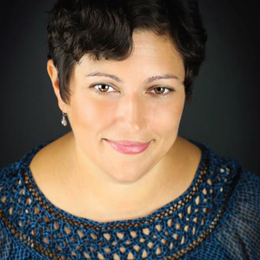
WHEN ELIZABETH BRADEN FIRST TRIED HER HAND AT MUSIC, beginning with piano lessons at age 7 and school musicals only a few years later, little did she realize her series of musical endeavors of weekly lessons, musicals, choirs and school bands would place her amidst the rehearsal hall of Opera Philadelphia—as the third female conductor, nonetheless. In fact, it wasn’t until graduate school at Westminster Choir College in Princeton, N.J., that she discovered her true passion for opera.
“Opera began for me when I was a singer in the Spoleto Festival Choir in Spoleto, Italy, where we sang concerts and were the opera chorus for all of the festival’s opera productions,” she says. “I may have caught the opera bug those early summers singing in Spoleto, but I have come to love and value it so much during my years at Opera Philadelphia.”
Being chosen as the organization’s only third female conductor throughout its 43- year long history in Philadelphia, Braden couldn’t be more honored and humbled to make a lasting impact in what she describes as a predominately male industry. She hopes to not only put on a successful grand premiere of The Wake World on Sept. 18, but hopes along the way to inspire and encourage women of all ages and professions to simply never say never.
How did your journey with opera begin?
My opera experience began in college and graduate school, when I was a singer in the Spoleto Festival Choir. The director of that choir was Donald Nally, who was the Chorus Master at Opera Philadelphia before me, and who was also a professor and mentor of mine. I learned music from these experiences and grew to love opera ... opera is incredibly fun and exciting because it ties together many aspects of the arts and requires a lot of collaboration between art, production, etc., to come together in order to create a successful production.
You mentioned The Wake World is a very special opera for numerous reasons. What can you tell us about the upcoming production?
What I believe makes [The Wake World] special, is how it came about—namely, that it was written to feature the Opera Philadelphia Chorus specifically. While there are many operas that have a large and important chorus part … this opera was written specifically for this chorus, making it unique. It features a 16-voice chorus, along with two soloists and a five person orchestra. Since The Wake World will be performed at The Barnes Foundation, composer David Hertzberg knew that we would be performing in a large and very acoustically live venue, so he wrote some amazing music that will just soar in this wide open space, very different from the average opera hall. Lastly, and perhaps most importantly, I think the music is very special. There are passages that, when I play them on the piano or sing them in my head, I’m almost moved to tears at their beauty.
Is there ever a time you find yourself overwhelmed in two roles, or is there a thrill in the challenge?
There is definitely a thrill in the challenge. It is a bit overwhelming to head into Opera Philadelphia with both chorus master and conducting duties, but I wouldn’t have it any other way. I love being the chorus master and I’m also elated to be making my conducting debut. One advantage of doing “double duty” for The Wake World is that from day one, the chorus will have the advantage of working with the conductor. In a challenging world premiere, I hope serving as two roles will be a great advantage to the chorus—and will be well worth my challenge.
You’re the third female conductor in Opera Philadelphia’s 43-year history. How is this a testament to your success as a woman in the industry?
Conducting is a male-dominated field, though women are making some inroads. I think that in the field of choral conducting, women are more prevalent than in the field of orchestral or opera conducting—though hopefully, all fields will become more equitable in coming years. Since The Wake Worldwas written to feature our chorus, I’ve been successful with preparing and conducting our chorus over the years, and I believe it was a testament to my success here.
What do you feel your role as the conductor in The Wake World says to women in Philadelphia—or as you’ve coined it, making “her-story”?
I hope that my role as the only female conductor in Opera Philadelphia 2017 provides hope to young women in music— or any field—who want to succeed in a field which is still predominately populated by men. I also hope we can move toward a time when being a female conductor isn’t so unusual. Women tackle great roles in fields all over the Philadelphia and New Jersey regions; and I’m proud to be among those numbers.
Lastly—any favorite spots in Philadelphia?
I could write an entire article on this alone. One of my newer favorite restaurants is Charlie Was a Sinner. I’ve been enjoying beers and fries from Monk’s for years. I love walking through Rittenhouse Square; watching the Phillies play at Citizen’s Bank Park (even in these lean years); and the great diners of Philadelphia ... and of course, my home away from home—The Academy of Music—which is the place where I not only go to work, but also where several years before I worked for Opera Philadelphia, I met my (now) wife, Dennie in the Rehearsal Hall … 18 years later, I still go to work in that Rehearsal Hall every day.
Published (and copyrighted) in Suburban Life Magazine, September, 2017.
.
.
.


